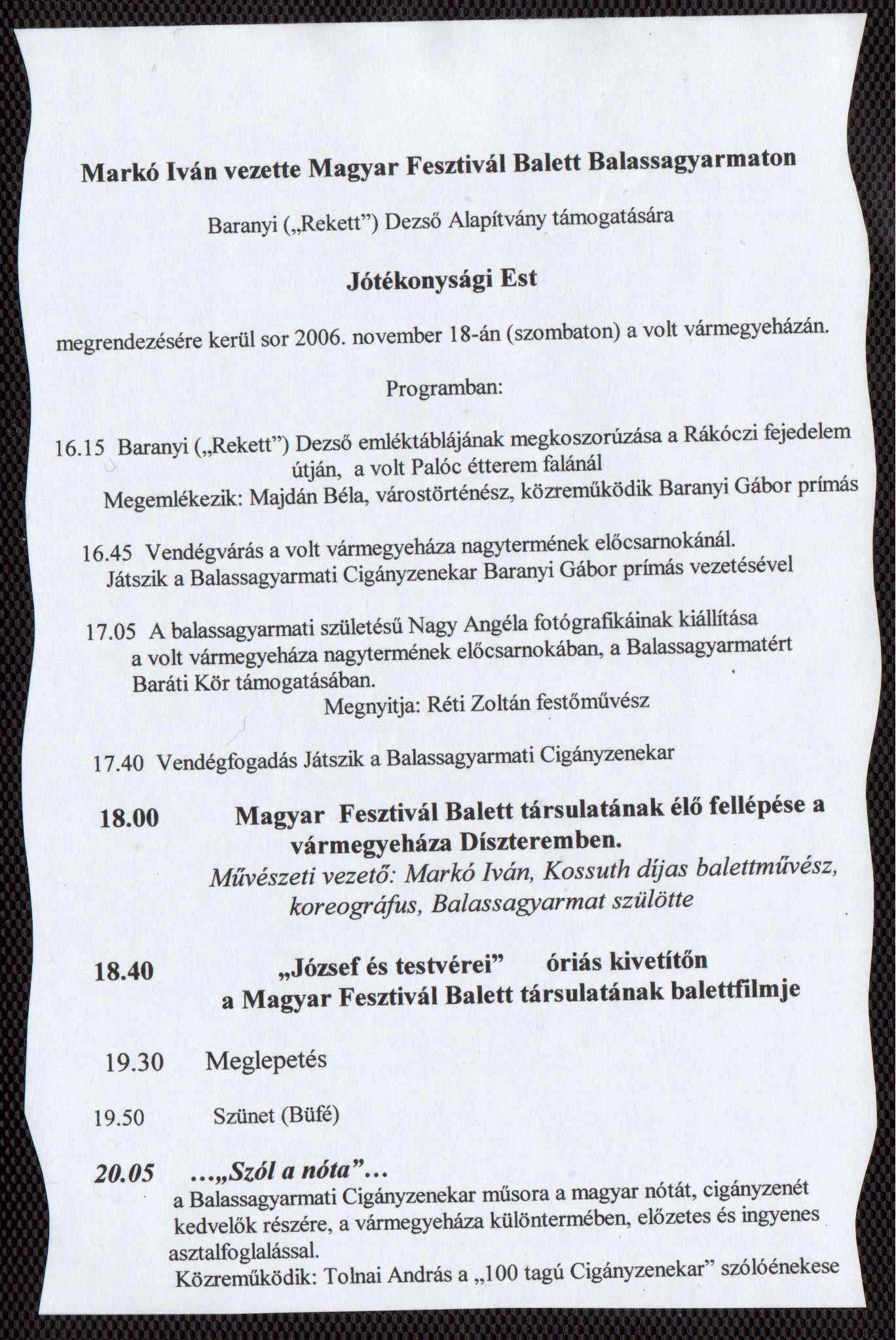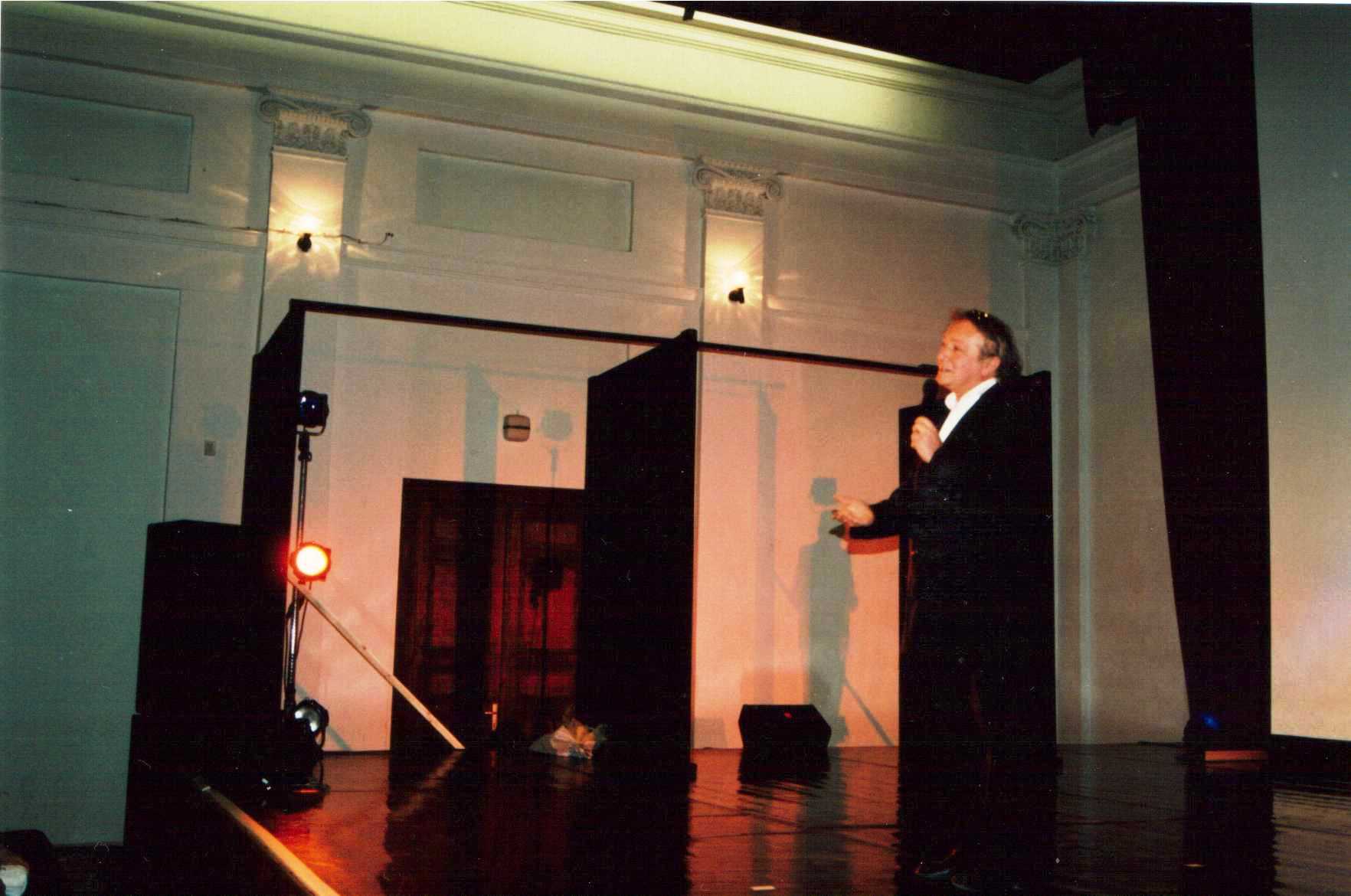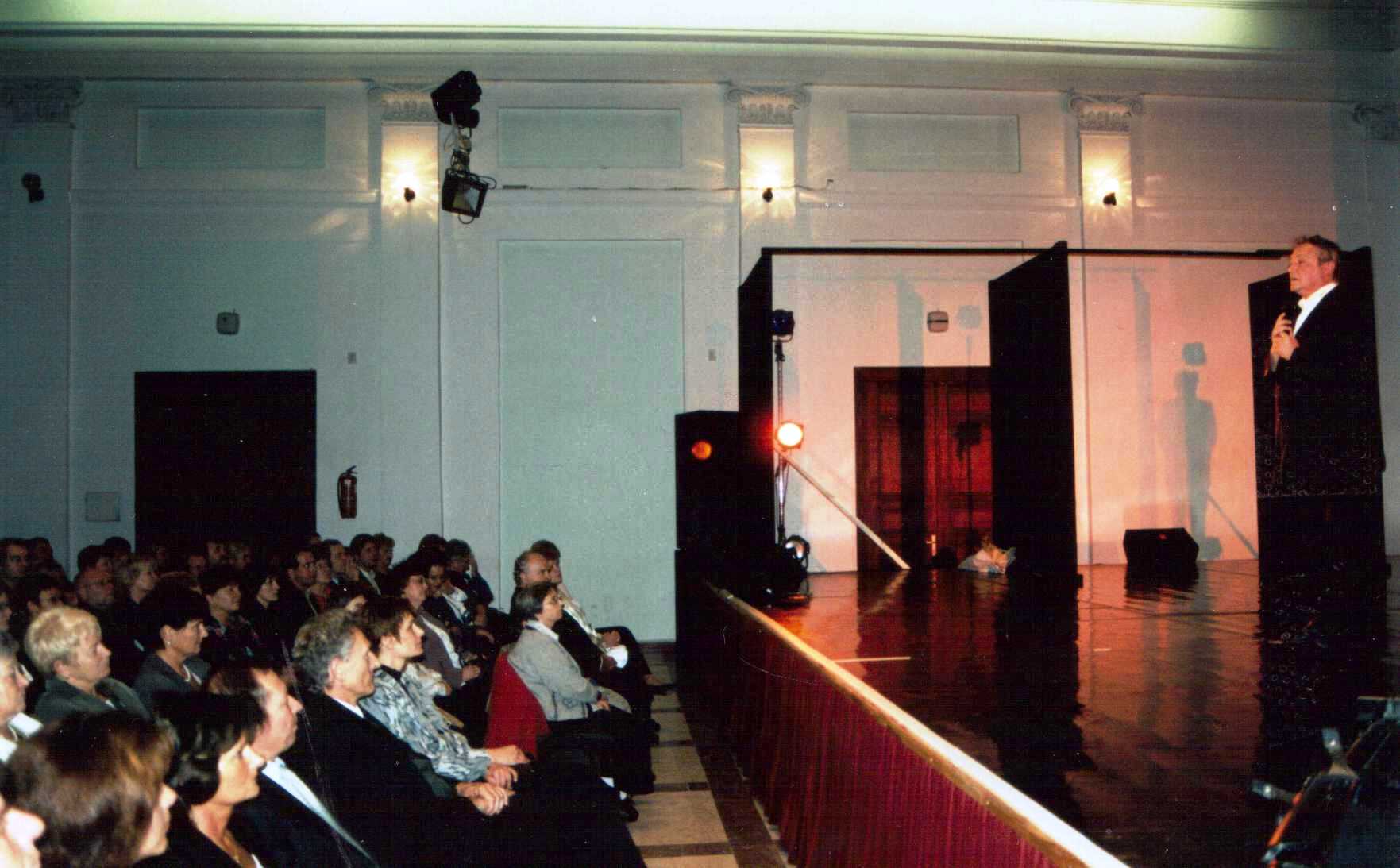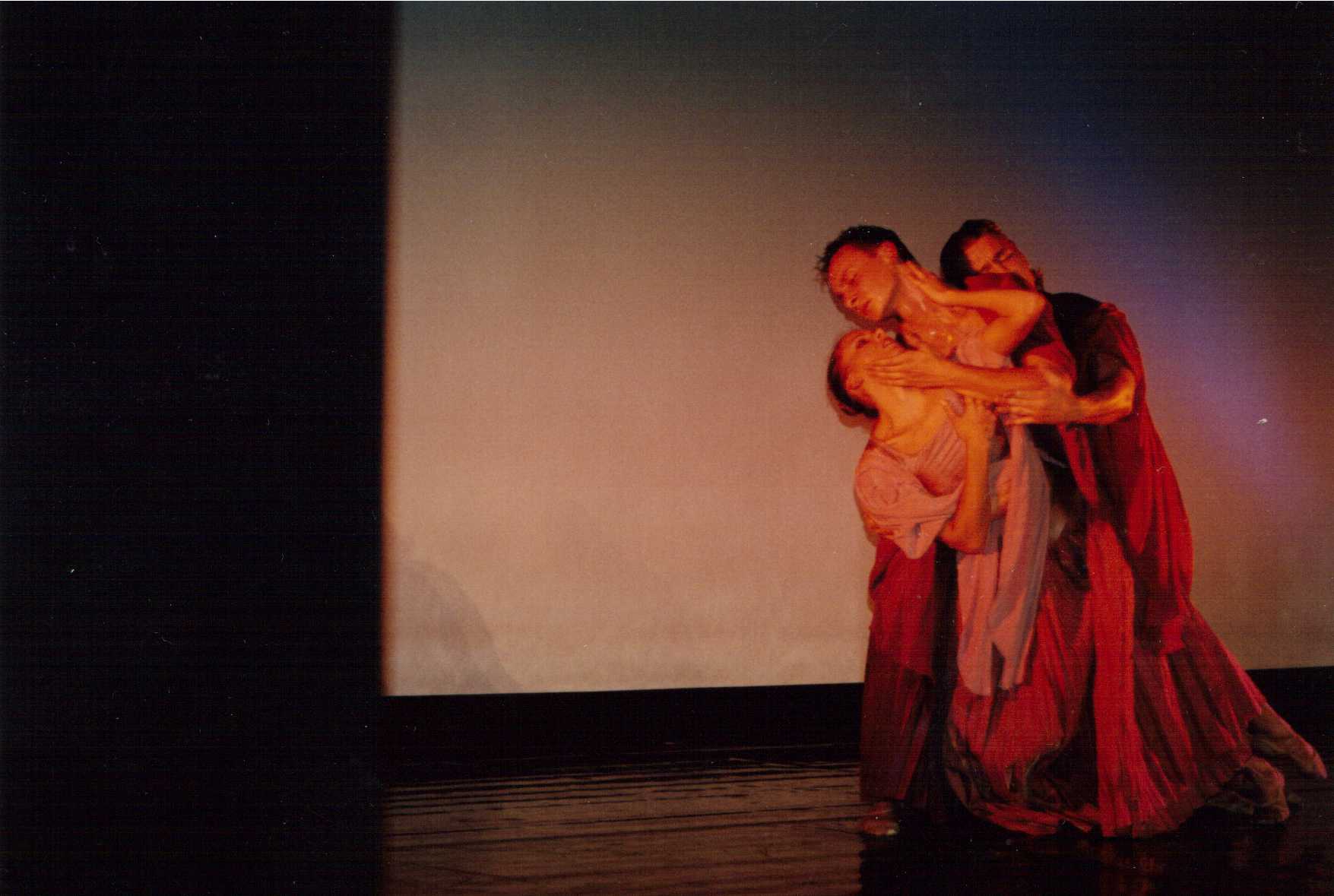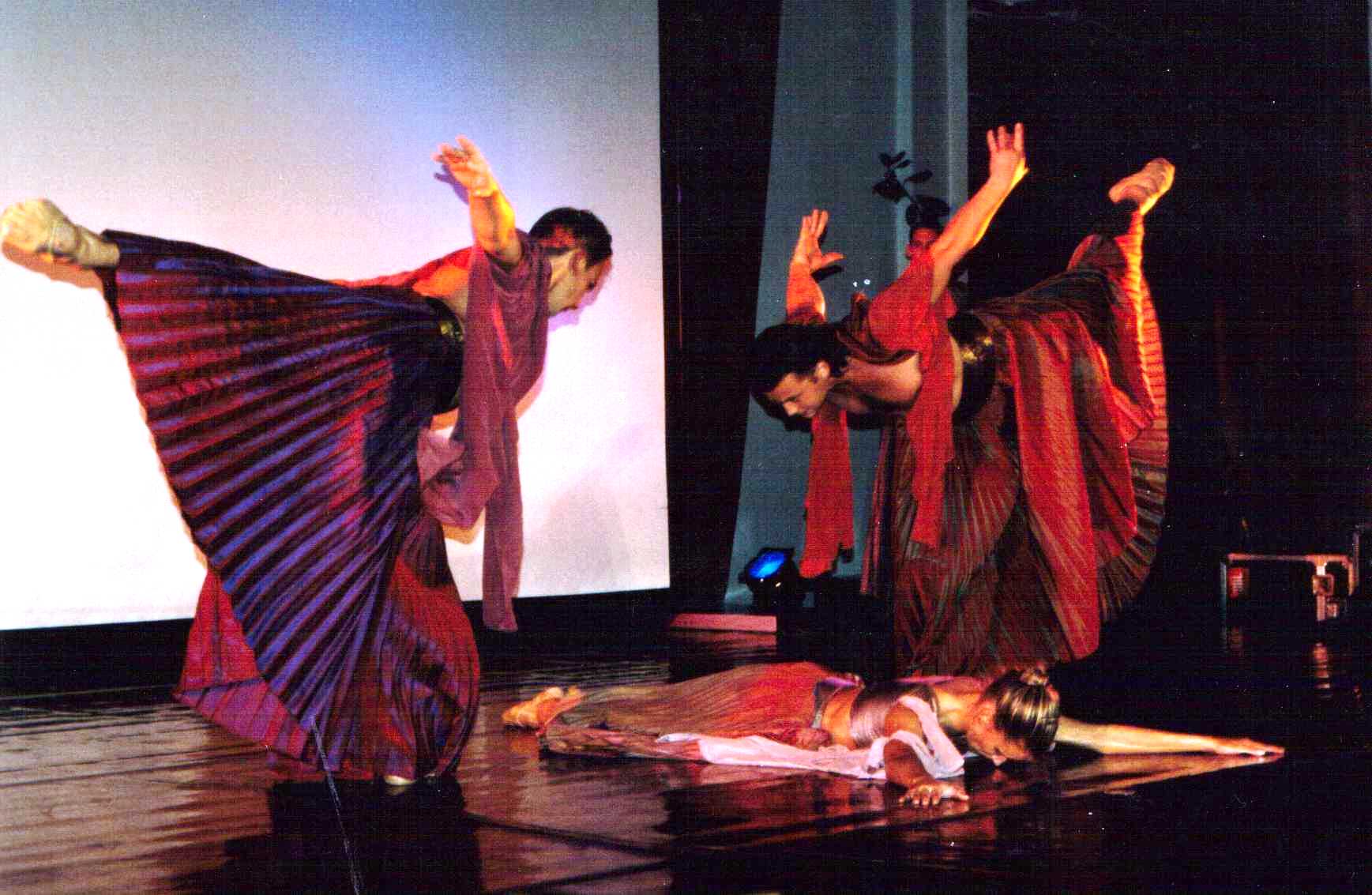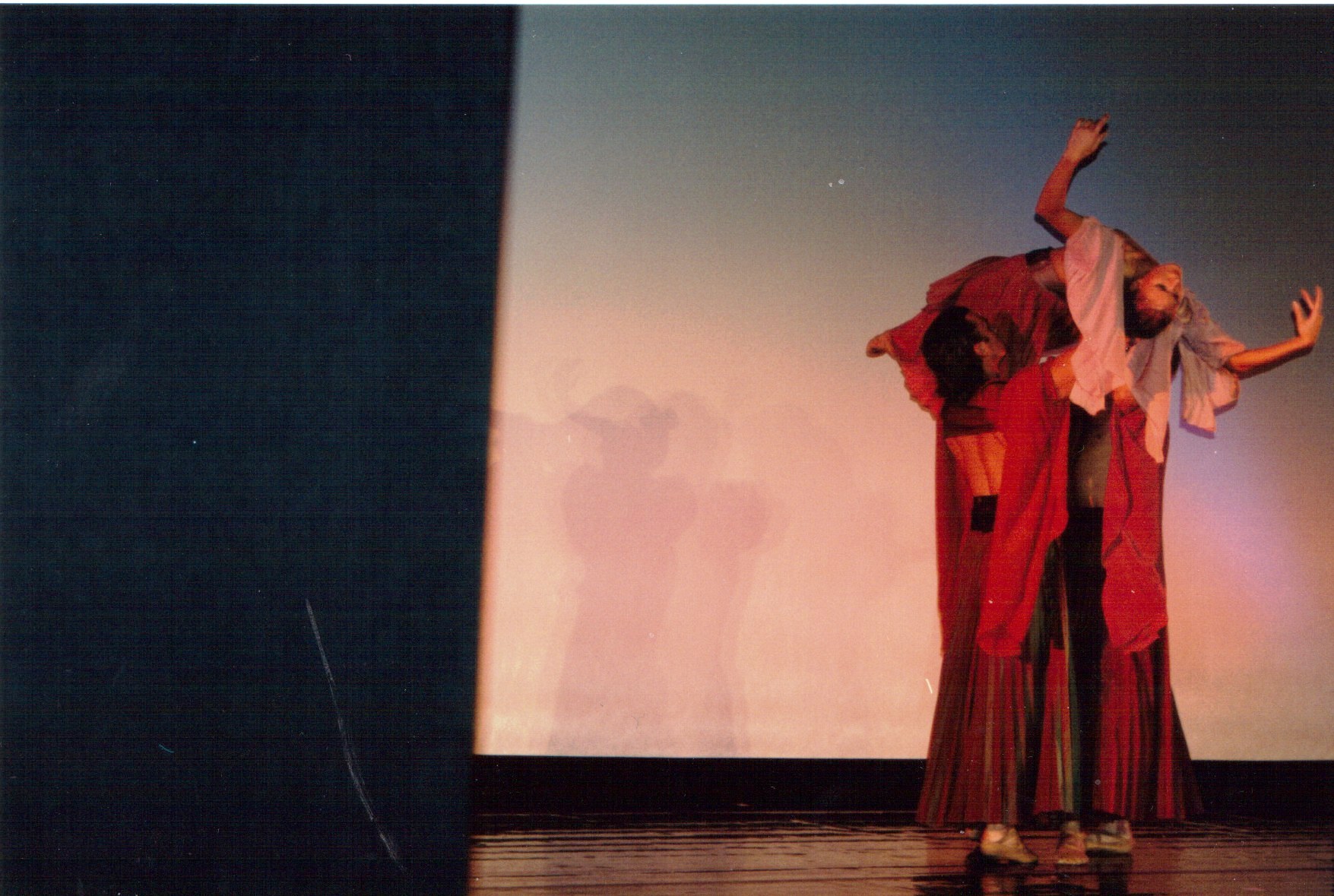Performance of Iván Markó and the Hungarian Festival Ballet in Balassagyarmat
18. November 2006.
Performance of the Hungarian Festival Ballet leaded by Iván Markó in Balassagyarmat
Charity evening to support the Dezső "Rekett"Baranyi Foundation
Below you can read the article of László Nagy, who authorized to publish it here too, it is taken from the webpage of the Circle of Friends for Balassagyarmat. We would like to thank their cooperation hereby.
A small town is searching for its cultural roots
A small, patriotic circle with a few supporters undertook no smaller task, than bringing art, music, dance together for one afternoon, in November of 2006., reminding the whole city to its cultural roots.
Those cultural roots, which were partly forgotten, but they partly still remained, and we can bbring them forth again, if search for them thoroughly.
The hungarians, the serbians and the instrumentalist gypsies together with greeks and the jews once created a varied but somehow still coherent culture, profile. This tradition, the past, was supposed to be invoked throughout this unique programme, but also a hopefully a more "highbrow" future.
The first event was at the Rákóczi street, where they wreathed the memorial tablet of Dezső "Rekett" Baranyi on the wall of the Palóc restaurant, and where Béla Majdán historian, the supporter of the local gypsy musicians, held a speech. The girdles were placed by offsprings and by the emissaries of the Minority Commune of the city and the county.
Dezső "Rekett" Baranyi died in 1960, and he was a well-respected man among te musicist gypsies of the town. He played in the hotel of the town with his band, and his name became a legend, even across the borders of the county.
Zoltán Réti - who considered the musician as his close friend - recalled to his life and to his memory in his opening speech at the exhibition. in a radio record from 1951, both János Manga and László Lajtha said about Baranyi, that he is the true heart and soul of the gypsy music and he is prominent among the numerous gypsy musicians of our country.
 The Baranyi Rekett Dezső Foundation was founded in his honour, and its goal is to support the young, local gypsy musicians.
The Baranyi Rekett Dezső Foundation was founded in his honour, and its goal is to support the young, local gypsy musicians.
After the girdles were placed outdoors, everyone went indoors, into the assembly hall of the County House, where they were welcomed by the leading musician of the local gypsy band, Gábor Baranyi, and his band played a little music. Then Zoltán Réti painter opened the exhibition of Angela Nagy, who was born in Balassagyarmat, and who is a supporting member of our Foundation.
Her art linked the past and the future together. The past, because the inspiration came from her trip to Transylvania in 2006, where he saw the saxon fortress at Prázsmár, and she was enchanted by the spirituality of the place, by the architectural uniquness of the building, which both served religious and defensive purposes. Angela made a lot of pictures there.
 But it also represented the future, because the technology she used was digital pixel graphic processing, a real "colour-magic" .
But it also represented the future, because the technology she used was digital pixel graphic processing, a real "colour-magic" .
As Zoltán Réti told us in his opening speech, this colouring is not coming from a tube, it is not working with the traditional colours, but it gives us an opportunity to experiment with whole new ones. Angela knows the colour-dynamics very well, her paintings, artworks, which she created on her computer, were part of many local and foreign exhibitions.
But the real, undeniable highlight of the evening was the performance of the Hungarian Festival Ballet (led by Iván Markó), which was a really high standard show by an internationally respected group of dancers. Zoltán Réti also referred to this, when he said, he can't remember a single time, when our city had a more quality guest, and he said, he hopes, that the County House will regain some of its long lost fame because of the event.
Béla Majdán, the organizer of the program, welcomed the audience on the expanded stage of the assembly hall.
- The past of Balassagyarmat reveals, that throughout the centuries, here the different religions, different opinions were able to live together in harmony. The christian, the jewish and the gypsy culture all have their own traditions. This town is a town of high standards and culture, and it became clear today, since so many of you gathered to see this even, we could easily fill a room twice the size of this assembly hall with all those, who were interested.
The Foundation had a very short amount of time to create the conditions suitable for the ballet, and they had support from the local government and from the local contractors. Béla Majdán did not mention any names, but he added, we all know, who helped.
Iván Markó was moved by the spirited applause and welcoming from the crowd, and he said: "I came back, I came home, again, to Balassagyarmat".
Markó was born in a house near the current main square of the town, where now the Civitas Fortissima statue stands. He took his first steps toward world-wide fame in our town, and today, on his 60th birthday he came back to us, to show us, what he became. Throughout the evening, Mrs. Gábor Csiki sang a csango folk-song in his honour, he learned that péter Jagyutt, the famous confectioner of the town, was born only hours after him, and he was very happy, when he learned, that auntie Kató Zmeskál, maternity nurse, who helped his mother give birth to him, is sitting among the audience.
 The Hungarian Festival Ballet performed the ballet The message of the Angels, (the picture you can see on the left side, was taken by Zsolt Szugyiczki).
The Hungarian Festival Ballet performed the ballet The message of the Angels, (the picture you can see on the left side, was taken by Zsolt Szugyiczki).
The joy of music and dancing, the eternal human desire to defeat gravity, the spiritual, emotional and sensual experience of flying inspired the choreographer, Iván Markó.
This thought-provoking, enchanting, dashing, wonderful mixture of music and dance, the emotional power, spiritual and dynamic harmony, really created a chatartic experience.
The Message of the Angels is a real message, it can show us a way to one another, it can make us realize, that we are depending on each other, since we are living in a tense and besetting world.
The Message of the Angels is about the christian mystery, and the second part of the performance, the Joseph and his siblings mis also based on the Bible, but it is also inspired by literature.
Based on the Bible, because it is about the eternal story of Jacob and his favourite son, Joseph, and it was a well-known symbol in art throughout the centuries.
Markó wanted to create a musical from the Thomas Mann version of Joseph and his siblings, ever since he was a little child, and he read it for the first time, so its safe to say, that with this ballet, he managed to fulfill his artistic dream.
 The purity of Joseph, his wisdom and talent creats a sharp counterpoint with his greedy siblings, and we need plays like this now more, than we ever did. The dance of Markó takes us back to the past, and the show also serves as a mirror, reflecting our society in the tempting, lewd Mrs. Potifár, in the figures of the cruel siblings, in the mighty but also rickety pharaoh, in Jacob, who opposes even the angel. Today these kind of heroes are still existing, only a little bit differently.
The purity of Joseph, his wisdom and talent creats a sharp counterpoint with his greedy siblings, and we need plays like this now more, than we ever did. The dance of Markó takes us back to the past, and the show also serves as a mirror, reflecting our society in the tempting, lewd Mrs. Potifár, in the figures of the cruel siblings, in the mighty but also rickety pharaoh, in Jacob, who opposes even the angel. Today these kind of heroes are still existing, only a little bit differently.
The play is also about caducity, about the siblings, who would do anything for money, and about the tormenting solitude of those, who oppose the mammon, about jealousy, vanity, but most importantly about the faith in arts, which is the favourite subject of Markó.
We were able to meet wonderful, talented dancers, in person, and on the projected presentments, and the most prominent was Gábor Nyári, who played the role of Joseph. He was almost a spitting image of the young Markó, when the balletmaster told the young Joseph to go, a lot of us thought, we are seeing some kind of visual effect.
But no.
The master inspired a younger generation, gave them his knowledge, watched over their path, and while he treasures the moments of the past, he is also building a future.
The Joseph and his siblings got a really worthy intro and outro in the sometimes enchanting sometimes dynamic music of the bosnian componist Goran Bregovic.
Iván Markó said the following in a previous interview:
- Those, whose expectations I wanted to meet, especially my mother's, are no longer alive. Only the audience and the Allmighty remained to me.
Yes, the two greatest critics. This is why the life of an artist is hard. You always need to meet the expectations, and this is the ultimate challenge, the eternal struggle.
- I received nothing good from the so called professionals in Hungary. Neither from the Ballett Institution, or from the Opera House, nor from the years I spent in Győr. I have good relations with a few good artists, but for me, there is no "professinal ballet" in Hungary. There are only artists. I don't know what profession is, I only know what an individual is. And why on Earth should we call ballet a "profession" anyway?!
These are harsh, but honest words.
We should hope, that these words are only the results of a bad period in the artist's life, that the success of a Saturday night, when the audience is giving a standing ovation, when they see Markó entering the stage, will somewhat balance out this negative summary.Even if it did, it was only a little bit better, we will still know, there is truth behind those words.
After the Festival Ballet finsihed its performance, Markó promised, if the town will invite him again, he will bring us the famous show based on Ravel's Bolero.
He asked the crowd in the beginning to be a part of the show, and in the end he brought them to book for it, but he was the only one, who could see, as the 700 hands tried to imitate the movements of love, some of them softly, some of them clumsily.
Yes we understood, or at least we think, we understood the global message of the evening.
Yes we are all depending on each other, we are all different, but also in our differences, we are somehow the same, we have to be united, but we are separated, we want to love, but we are less and less capable of doing so, we are not trying hard enough, we don't want it hard enough, we are responsible for each other, for everything, for the Earth, for the river, and for the woods. Our sin is vanity, and we long for success, some are chasing little delights, some are chasing the big picture, but if we achieve it, we are no longer able to feel the taste we coveted.
However the faith and the love are the only things, which are connecting us. I don't know how many of us were enchanted by the magic of music and art, and how long will it holds us in its grasp, I don't know. For one night, I am sure many of us felt the same.
I would like to share this message, the message of this evening with others, with all those, who want to see the words, the acts, and the questions of responsibility from a dffferent angle.
18th November, 2006.
László Nagy
Further pictures about the event:
Photographies by Nelly Kiss



